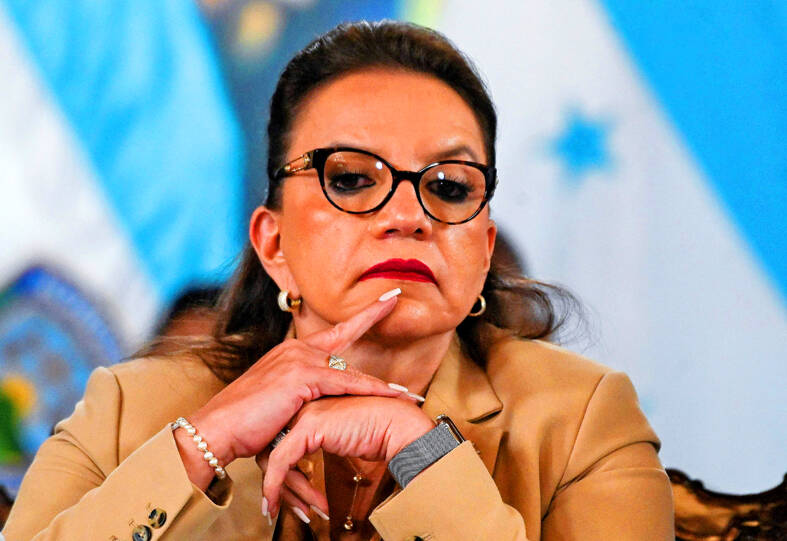The Ministry of Foreign Affairs yesterday said that it had expressed “grave concern” to the government of Honduras after Honduran President Xiomara Castro on Tuesday wrote on Twitter that it would pursue official diplomatic relations with China.
In addition to issuing a statement, Vice Minister of Foreign Affairs Alexander Yui (俞大㵢) summoned Honduran Ambassador to Taiwan Harold Burgos to the ministry in Taipei early yesterday to voice the government’s concerns.
The meeting lasted about 20 minutes and Burgos did not make any public comments upon arriving at the ministry.

Photo: Sam Yeh, AFP
Burgos said shortly after noon that he had not yet heard from his country’s foreign ministry.
“President Castro has given an instruction to [Honduran] Minister [of Foreign Affairs Eduardo Enrique] Reina. We are waiting for further direction from our ministry,” he said.
Burgos was referring to a post by Castro early yesterday morning Taiwan time expressing her desire to seek official ties with China — a position she had taken during her presidential run, but appeared to back off from after taking power in January last year.

Photo: AFP
“I have instructed Chancellor Eduardo Reina to manage the opening of official relations with the People’s Republic of China as a sign of my determination to comply with the government plan and expand the borders freely in concert with the nations of the world,” she wrote in Spanish.
The foreign minister position is colloquially called “chancellor” in some Spanish-speaking countries.
Castro did not specify whether her country would end diplomatic relations with Taiwan before securing ties with China.
China requires that Taiwan’s allies sever ties with Taipei before establishing relations with it.
Taiwan’s foreign ministry said in a statement that it was not considering ending diplomatic relations with Honduras before the Central American country announced a diplomatic switch.
However, Taipei has expressed grave concern to Tegucigalpa over the post, and would continue to engage in talks with the ally and stress that Taiwan is a genuine friend and partner that has offered assistance to Honduras for decades.
Beijing always offers “false promises” to Taipei’s allies, with the sole purpose of snatching them away to diminish Taiwan’s international presence, the statement said.
Unlike China, Taiwan has for many years pushed forward projects that improved the well-being of Hondurans, it said.
“Our government has asked our Honduran counterpart to carefully consider [the situation] and not fall into China’s trap and make a wrong decision that would jeopardize our decades-long bilateral friendship,” the statement said.
Honduras is an important ally of Taiwan, it said, adding that Taiwan’s government would continue working with like-minded countries to strengthen cooperation and deepen friendships with its allies.
If Honduras were to end official diplomatic relations with Taiwan, the nation would be left with relationships with 12 UN member nations, as well as the Vatican and Somaliland.
Honduras would also become the ninth diplomatic ally, and fifth in Latin America, Taipei has lost to Beijing since President Tsai Ing-wen (蔡英文) took office in May 2016.

ENDEAVOR MANTA: The ship is programmed to automatically return to its designated home port and would self-destruct if seized by another party The Endeavor Manta, Taiwan’s first military-specification uncrewed surface vehicle (USV) tailor-made to operate in the Taiwan Strait in a bid to bolster the nation’s asymmetric combat capabilities made its first appearance at Kaohsiung’s Singda Harbor yesterday. Taking inspiration from Ukraine’s navy, which is using USVs to force Russia’s Black Sea fleet to take shelter within its own ports, CSBC Taiwan (台灣國際造船) established a research and development unit on USVs last year, CSBC chairman Huang Cheng-hung (黃正弘) said. With the exception of the satellite guidance system and the outboard motors — which were purchased from foreign companies that were not affiliated with Chinese-funded

PERMIT REVOKED: The influencer at a news conference said the National Immigration Agency was infringing on human rights and persecuting Chinese spouses Chinese influencer “Yaya in Taiwan” (亞亞在台灣) yesterday evening voluntarily left Taiwan, despite saying yesterday morning that she had “no intention” of leaving after her residence permit was revoked over her comments on Taiwan being “unified” with China by military force. The Ministry of the Interior yesterday had said that it could forcibly deport the influencer at midnight, but was considering taking a more flexible approach and beginning procedures this morning. The influencer, whose given name is Liu Zhenya (劉振亞), departed on a 8:45pm flight from Taipei International Airport (Songshan airport) to Fuzhou, China. Liu held a news conference at the airport at 7pm,

GRIDLOCK: The National Fire Agency’s Special Search and Rescue team is on standby to travel to the countries to help out with the rescue effort A powerful earthquake rocked Myanmar and neighboring Thailand yesterday, killing at least three people in Bangkok and burying dozens when a high-rise building under construction collapsed. Footage shared on social media from Myanmar’s second-largest city showed widespread destruction, raising fears that many were trapped under the rubble or killed. The magnitude 7.7 earthquake, with an epicenter near Mandalay in Myanmar, struck at midday and was followed by a strong magnitude 6.4 aftershock. The extent of death, injury and destruction — especially in Myanmar, which is embroiled in a civil war and where information is tightly controlled at the best of times —

Taiwan was ranked the fourth-safest country in the world with a score of 82.9, trailing only Andorra, the United Arab Emirates and Qatar in Numbeo’s Safety Index by Country report. Taiwan’s score improved by 0.1 points compared with last year’s mid-year report, which had Taiwan fourth with a score of 82.8. However, both scores were lower than in last year’s first review, when Taiwan scored 83.3, and are a long way from when Taiwan was named the second-safest country in the world in 2021, scoring 84.8. Taiwan ranked higher than Singapore in ninth with a score of 77.4 and Japan in 10th with